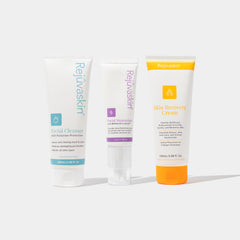Puberty is a time of big changes—both physically and emotionally. For teens with eczema, these changes can make managing their skin even more challenging. Hormonal shifts, stress, and lifestyle adjustments can trigger more frequent or severe eczema flare-ups. In this blog, we’ll explain how puberty affects eczema and share practical, easy-to-follow tips to help teens keep their skin healthy.
Why Does Puberty Make Eczema Worse?
-
Hormonal Changes
- During puberty, your body produces more hormones like cortisol, testosterone, and estrogen.
- Cortisol (the stress hormone) can make eczema inflammation worse.
- Changes in skin oil (sebum) production can weaken the skin’s protective barrier, leading to more irritation (Zhou et al., 2018).
-
Stress and Eczema
- Puberty can be stressful—think exams, peer pressure, and big life changes.
- Stress increases cortisol levels, which can trigger eczema flare-ups (Abramowitz, 2019).
-
Sweat and Activity
- Teens are often more active, which means more sweating.
- Sweat can irritate sensitive skin and lead to itchiness and redness.
Simple Tips to Manage Eczema During Puberty
1. Build a Gentle Skincare Routine
- Use a moisturizer daily, like Rejuvaskin’s Skin Recovery Cream, to keep skin hydrated and protected.
- Clean your skin with a gentle, fragrance-free cleanser to avoid irritation. Shop here.
2. Reduce Stress
- Practice relaxation techniques like deep breathing, yoga, or meditation.
- Get enough sleep every night—your skin heals best when you’re well-rested.
3. Avoid Triggers
- Wear loose, breathable clothing to prevent sweat buildup.
- Stay away from harsh soaps, detergents, and scratchy fabrics.
4. Eat Skin-Healthy Foods
- Include foods rich in omega-3s, like fish and walnuts, to fight inflammation.
- Zinc-rich foods, like seeds and nuts, can support skin repair and health (van Zuuren et al., 2017).
5. Treat Flare-Ups Quickly
- During a flare-up, use a hydrating cream or other prescribed treatment.
- Avoid scratching—it can make eczema worse and lead to infection.
How Rejuvaskin Helps Teens with Eczema
Rejuvaskin’s Skin Recovery Cream is:
- Hydrating: Keeps skin soft and moisturized.
- Soothing: Calms redness and irritation during flare-ups.
- Gentle: Fragrance-free and perfect for sensitive teenage skin.
Teens can use it daily or as a quick fix during flare-ups to restore their skin barrier.
FAQs About Eczema and Puberty
Q: Does puberty make eczema worse?
A: Yes, hormonal changes, stress, and increased sweat during puberty can make eczema worse.
Q: Can skincare really help?
A: Absolutely! A consistent routine with gentle, hydrating products can reduce flare-ups and improve skin health.
Q: What should I avoid if I have eczema?
A: Avoid triggers like scratchy fabrics, harsh soaps, and fragrances.
Eczema can feel harder to manage during puberty, but the right strategies make a big difference. By staying consistent with skincare, managing stress, and using trusted products like Rejuvaskin’s Skin Recovery Cream, teens can enjoy healthier, happier skin. For stubborn eczema, a visit to a dermatologist can help you find even more solutions.
Works Cited
- Abramowitz, J. D. (2019). Hormone Therapy in Children and Adolescents. Endocrinology and Metabolism Clinics of North America. Link
- van Zuuren, E. V., Fedorowicz, Z., & Arents, B. (2017). Emollients and moisturisers for eczema. The Cochrane Database of Systematic Reviews. Link
- Zhou, Z., Liu, T. H., & Zhang, Z. (2018). Zinc-responsive exfoliative dermatitis in a 17-year-old girl. Clinical and Experimental Dermatology. Link





















Leave a comment